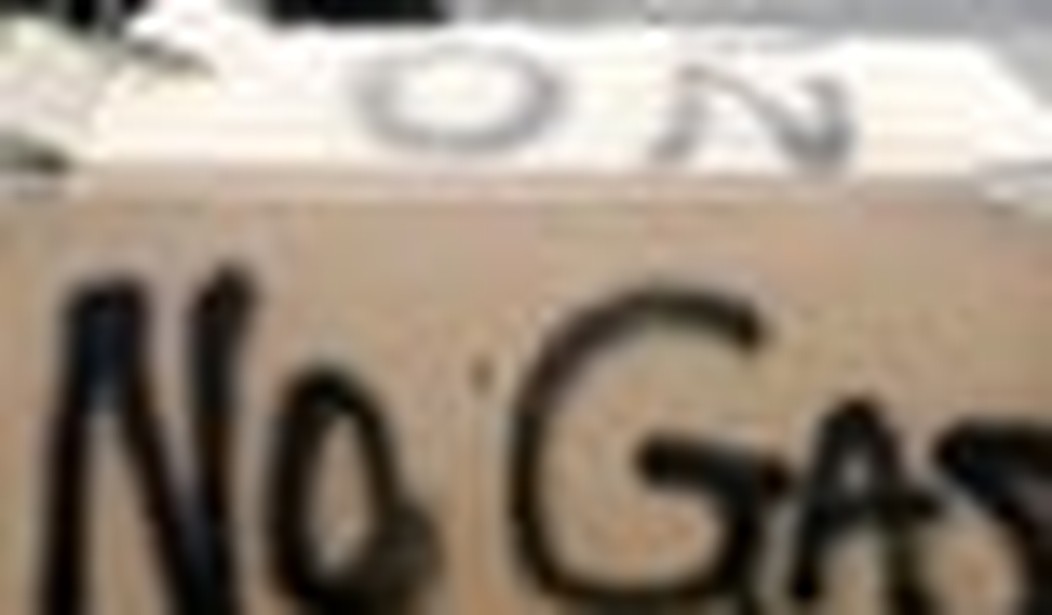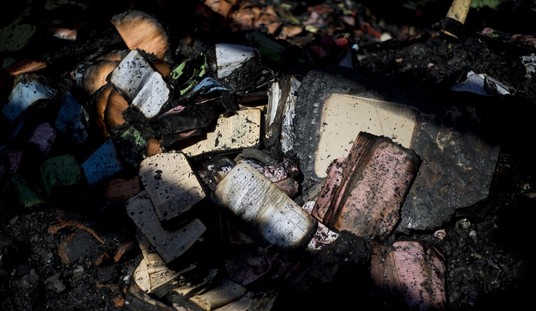The problems keep piling up for the Iranian regime. It has lost its very important backers in the bazaars who went on strike to protest a massive tax increase. In the most underreported Iran-related story, workers continue to go on strikes at factories around the country. Now, the regime is facing a gasoline shortage that is causing even more angst among the populace.
The fear of penalties from the U.S. and Europe is causing Western businesses to flee. Banks aren’t giving loans, and dozens of shipping vessels can’t get insurance. On July 26, Reuters reported that only three cargoes of gasoline had arrived for the month — coming from Turkey and China — and a fourth was expected to arrive soon from Venezuela. Between 11 and 13 cargoes of gasoline normally arrive during this time of year, so this is a major drop.
Security forces have been deployed to major gas stations to prevent them from becoming scenes of discontent. On July 23, there were clashes in Tehran when those waiting in a long line at Roosevelt Gas Station greeted the security forces by shouting “Death to dictatorship.” On July 18, citizens angry at high fuel prices booed the security forces at a station on Mosadegh Street in Tehran, sparking clashes. Other gas stations are rationing their supply because of the shortage, resulting in very long lines that turn into public expressions of dissatisfaction. Some aren’t even operating. Half-hour long lines are being reported around Tehran and in other places such as Tabriz.
Some workers at stations are complaining that they are receiving tainted gasoline that causes two to three percent of the substance to evaporate. The government is reportedly fining them for using poor quality gas — when the government is responsible for delivering it. Additionally, this is all happening while there are intermittent electrical shortages in Tehran. These shortages in electricity and financing are causing some factories to close for weeks at a time.
Scattered protests by workers continue, and they are sure to grow as the high gas prices take a toll on the people. At one factory in Tehran, up to 400 employees are said to have been fired over the past five months. The workers say their jobs have been given to friends of government officials. Predictably, security forces were sent to the scene and high-level officials came to mediate, promising the workers they’d get paid within 15 days. The workers knew it was a gimmick and are threatening to release documents exposing government corruption.
At the same time, nearly 200 workers are protesting in Qazvin because they haven’t been paid in six months.
I am unsure of the bazaars’ current status, but as of July 21, the bazaar in Tehran was open but described as “inactive.” The merchants are being forced to sign an agreement to pay 15 percent more in taxes, with an additional 15 percent penalty for those that refuse. The forms require personal information like home phone numbers the regime can use to track and punish those that challenge the tax increase. Those in power are definitely worried about the bazaars and know they won’t forget the abuses their thugs delivered to them during the recent strike.
The problem for the regime is that there is no short-term solution to the gas crisis, and all of the conflicts are interconnected and exacerbate each other. The discontent will fuel the political activists. The rising fuel prices will cause more workers to be fired or go unpaid just as they face increasing need for income. The bazaar merchants will be hurt as customers become cash-strapped, the cost of products increase, and they have to pay 15 percent more in taxes to the regime that uses violence and intimidation against them. The regime can try to ration the gasoline and reduce subsidies, but the last time that was tried, in 2007, it resulted in burning gas stations.
The regime is moving quickly to try to close the window of time with which the opposition and the West can exploit this vulnerability. It has signed a $6.5 billion deal with the Chinese company Sinopec to build refineries; it plans to build a pipeline that can deliver gas to Turkey that it hopes to finish in three years; and it is hoping to double the production of gasoline by 2012. The International Energy Agency says Iran can reduce their imports by 75 percent by 2015 by expanding their production and getting rid of subsidies — but the decreasing number of fuel providers will be a major obstacle.
The Revolutionary Guards had to back out of the South Pars gas field that could bring in an additional $130 billion per year, as well as two other refinery projects. They knew it would be tough to find foreign investors for an IRGC venture, and these bold plans will have to be delayed or canceled without foreign investment. The attitude change of the United Arab Emirates is another blow to the regime, as half of Iran’s gasoline imports arrive through its territory and the country is a major trading partner.
The U.S. needs to act quickly to let any company involved in this effort know they will be sanctioned and will lose more money than they gain if they make this unwise business decision. Congress is pushing the Obama administration hard on this, but the president wants the legislation to allow him to shield companies in countries that have begun cooperating with us.
More sanctions are probably on the way. If the West wants to really stick it to the mullahs, it can target the source of about 90 percent of the regime’s export money: oil sales. One report says exports will have to end to meet rising demand inside the country by 2015.
This is not a bump in the road for the regime. The gasoline crisis is not going to end anytime soon and is going to become exponentially worse. It will be years before the regime begins decreasing its reliance upon imports, and the more time passes by, the more demand will grow. As demand grows, the regime will have to decrease its oil exports, ration gasoline, and carry the political hot potato of reducing subsidies.
The regime is on an unsustainable path and no company should be permitted to help them change that.









Join the conversation as a VIP Member